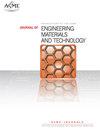Identification Method for Material Constants in Johnson-Cook Model Associated with Strain-Rate and Temperature Sensitivities Using Ball Impact and Indentation Tests
IF 1.9
4区 材料科学
Q3 ENGINEERING, MECHANICAL
Journal of Engineering Materials and Technology-transactions of The Asme
Pub Date : 2022-07-08
DOI:10.1115/1.4054957
引用次数: 1
Abstract
The Johnson-Cook (JC) flow stress model can simply express the strain rate and temperature dependencies of the flow stress. We previously proposed a concept of simple identification method for material constants in the JC model associated with the strain-rate and temperature sensitivities (JC parameters C and m) at high strain rates. However, several issues still exist in our method for practical use. In this study, we modified our method to identify both the JC parameters C and m. The fundamental concept was formulated based on the requirement that the normalized indentation depths obtained from the ball impact and instrumented ball indentation tests are equal to each other. In addition, the conversion factor was derived to transfer from the impact velocity to the strain rate. The ball indentation and impact analyses based on a finite element method were conducted to verify the established method. The analysis results obtained under idealized conditions demonstrated that C and m can be accurately identified using the established method, even at exceeding 10000 1/s. Changes in the radius of impactor are more effective in obtaining different strain rates than changes in the impact velocity, because the identification accuracy can be ensured at lower than 200 m/s.Johnson-Cook模型中与应变速率和温度敏感性相关的材料常数的球冲击和压痕识别方法
Johnson-Cook(JC)流动应力模型可以简单地表达流动应力的应变率和温度相关性。我们之前提出了一种简单识别JC模型中与高应变速率下的应变速率和温度敏感性(JC参数C和m)相关的材料常数的方法。然而,在实际应用中,我们的方法仍然存在一些问题。在这项研究中,我们修改了我们的方法来识别JC参数C和m。基本概念是基于从球冲击和仪器球压痕测试中获得的归一化压痕深度彼此相等的要求而制定的。此外,推导了从冲击速度到应变速率的转换因子。基于有限元方法进行了球的压痕和冲击分析,以验证所建立的方法。在理想化条件下获得的分析结果表明,即使在超过10000 1/s的情况下,使用所建立的方法也可以准确地识别C和m。与冲击速度的变化相比,冲击器半径的变化更能有效地获得不同的应变率,因为在低于200 m/s的情况下可以确保识别精度。
本文章由计算机程序翻译,如有差异,请以英文原文为准。
求助全文
约1分钟内获得全文
求助全文
来源期刊
CiteScore
3.00
自引率
0.00%
发文量
30
审稿时长
4.5 months
期刊介绍:
Multiscale characterization, modeling, and experiments; High-temperature creep, fatigue, and fracture; Elastic-plastic behavior; Environmental effects on material response, constitutive relations, materials processing, and microstructure mechanical property relationships

 求助内容:
求助内容: 应助结果提醒方式:
应助结果提醒方式:


